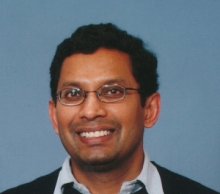MAE Seminar: Layered Thermal Metamaterials for the Efficient Directing, Harvesting and Dissipation of Heat

Professor
Department of Mechanical Engineering, University of California, San Diego
Abstract: A significant contributor to energy waste is the inevitable generation as well as the uneven dissipation of heat. Practical methods to adeptly channel heat flux would have many applications enabling improved energy utilization and thermal energy management. The aim of this talk is to review the use of relatively large-scale thermal metamaterials for thermal energy harness. A larger scientific objective is to describe thermal energy transfer (involving conduction, convection and radiation) on a unified basis, which may be provided through a metamaterials-type description. Thermal metamaterials will be described through a study of the underlying phenomena related to heat flux manipulation, exploiting the anisotropy of the thermal conductivity tensor. The notion of the assembled metamaterial as an effective thermal medium forms the basis for many of the investigations. An overarching aim is to implement in such thermal metamaterials, functionalities well known from light optics, such as thermal refraction, which in turn may yield novel applications, such as thermal lensing. Consequently, the harness - through the controlled manipulation of the directionality of the heat flux and efficient dissipation of heat – through a metamaterial-based perfect diffuser, which are for example, of much importance in energy conservation and improving electrical device performance, may be accomplished.
Bio: Prab Bandaru is a professor in UCSD’s mechanical engineering department, and is also affiliated with the electrical and computer engineering and the nanoengineering departments. After receiving his Ph.D. from UC Berkeley, he worked in applied materials on non-volatile random access memories and was a postdoctoral fellow in UCLA's electrical engineering and physics departments on low temperature physics as related to quantum information processing. Bandaru and his research group are mainly interested in analytical and experimental materials physics and chemistry and related applications, broadly looking at the electrical, thermal, electrochemical, photonic and mechanical properties of materials at the nano- meso- and macro-levels. Related research accomplishments include synthesis of new magneto-optic materials, establishing the maximum efficiency for thermoelectrics, measurement of the electrical conduction at the single molecule level, use of helical and Y-shaped carbon nanostructures for inductors and nanoelectronics, seminal non-contact optical measurements of thin film thermal conductivity, and sub 1 nanometer pore diagnostics in single layer graphene. Bandaru has been recognized through awards such as the Flint Seminar lectureship at Yale University, the National Science Foundation and the Scientific American Top 50.
Share
Upcoming Events
-
EECS Seminar: Less Compute, More Intelligence – Efficient and Autonomous Generative AI and Agents
-
MAE 298: Microscopic Robots that Sense, Act and Compute
-
CBE 298 Seminar: Interface Modification for Electrocatalysis
-
CEE Ph.D. Defense Announcement: Machine Learning and Remote Sensing for Environmental Modeling - From Large-Scale Streamflow Forecasting to Malaria Risk Mapping
-
CBE Special Seminar: Operando Electrochemical Methods at Dynamic Energy Materials Interfaces
